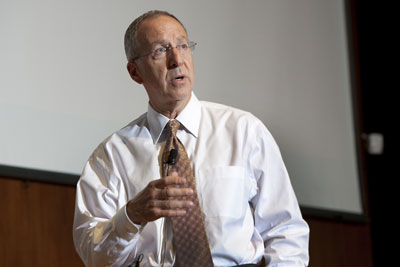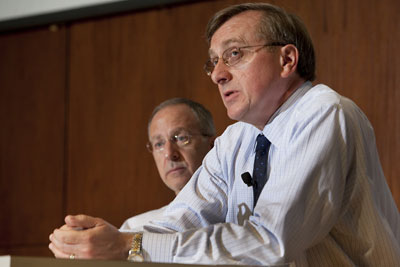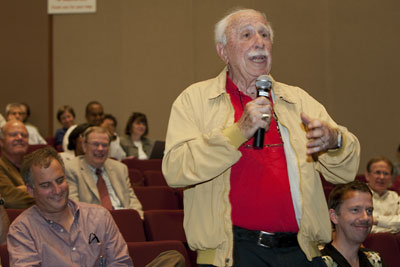Skorton: Strategic plan will give faculty flexibility
By Susan Kelley



There's a key reason why Cornell must erase its projected $215 million deficit over the next five years: so faculty members can regain the resources they need to fulfill their academic aspirations.
That was the point President David Skorton made Sept. 16 to about 200 faculty members and others at a forum in Kennedy Hall's Call Auditorium.
"It is not because of pressure from the board of trustees. It is not to make the balance sheet appeal to rating agencies," said Skorton at the second of five forums he and Provost Kent Fuchs are holding through October for staff, faculty and students about the university's strategic planning process.
"It's one reason, and one reason only: To return financial flexibility to the university so that we as faculty members can again pursue the initiatives, hiring and projects that we want to, reaching our aspirations without concern that one more aspiration will require the decrease of spending or activity in another area," Skorton said.
He emphasized that he believes faculty embody Cornell's three defining strengths: liberal arts education, public service and student access regardless of ability to pay. He values each faculty member's opinion, he said, including the faculty who have expressed deep concerns that the strategic plan will dilute those strengths.
Skorton encouraged faculty to continue to communicate with him; he also reviewed actions in the past year to whittle the deficit to $135 million from $215 million. They include FY 2010's 5 percent budget cut, deferring some construction and a 7 percent reduction in personnel -- two-thirds from voluntary retirements and one-third from layoffs.
Fuchs then describe in detail the strategic planning process now under way: the task forces that are looking at ways to reorganize and streamline Cornell's academic side; consultants who are making "recommendations, not decisions," on how to reduce administrative costs; and the provost's office long-term strategic planning. All three groups will circulate public reports in December, he said.
In response to a question in the Q&A period about how decision-makers would resolve potential cross-college conflicts regarding activities and funding, Skorton said each strategic decision will protect the progress and interests of colleges and units -- unless it conflicts with interests of the university as a whole.
Will faculty take on more of the academic work, such as premedical advising, which in recent years staff have been hired to do? That depends on the nature of the work, Fuchs said. "As faculty, are we using our time in a way that contributes to our core business? I think the areas you mentioned are core activities. It's a good point."
Responding to a question regarding innovation vs. efficiency, Fuchs said he and others will take time from October through December to thoroughly evaluate the academic recommendations. Skorton added that in such areas as procurement, the university may simplify, not innovate. He stressed that faculty should not be afraid to posit a hypothesis about restructuring and test it, just as they do in their own research. "Every decision can be reversed," Skorton said. "If we get frozen in doing something one way or another, that's what will defeat us."
Former Dean of Faculty Charlie Walcott urged Fuchs and Skorton to remember that laying off too many support staff would become counterproductive to faculty, and urged them "to preserve the teamwork that characterizes successful departments."
Another faculty member asked if $215 million was a conservative estimate of the university's deficit. Yes, Skorton said, adding that the endowment performed better than predicted in the past six months, and research and tuition revenues increased a bit more than expected as well. "I would rather see us be cautious. But we must also retain enough liquidity to face our challenges (such as making key faculty hires)."
Skorton closed the forum with a moment of silence in memory of Warren J. Schor, the 20-year-old student who recently died of complications related to H1N1 influenza.
A staff forum will be held Oct. 1, noon-1 p.m., in G10 Biotech. Student forums will be held Sept. 17 and Oct. 2, both 4:30-5:30 p.m. in Uris Hall Auditorium. Update: The Oct. 2 student forum has been postponed. All the forums are streamed live and archived at CornellCast.
Media Contact
Get Cornell news delivered right to your inbox.
Subscribe